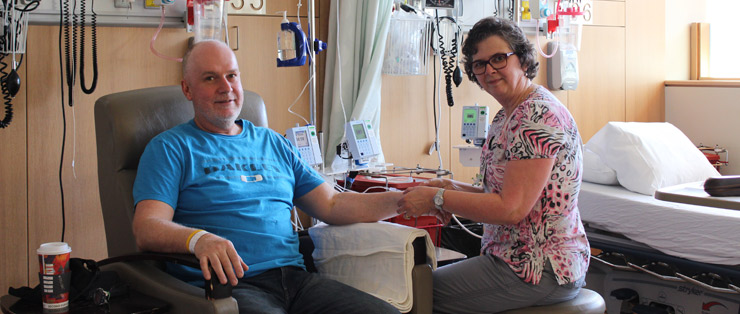Newsroom
Immunotherapy harnesses our own immune system to fight cancer
May 18, 2016

Ed Williams (left) didn’t expect to live more than six months after his skin cancer spread to his brain. But nearly three years later, he is alive and well thanks to immunotherapy. Michelle Renaud (right) is one of the registered nurses who administers his treatment every two weeks as part of a clinical trial.
It all started in 2011 with a new mole on his back. Within a few months, Ed Williams, then 47, was diagnosed with advanced melanoma. Despite the best available treatments, his cancer kept spreading, and he was told that his only option was to participate in a clinical trial of an experimental new therapy.
“I got into that trial the very last week it was open,” said Williams, a former high-school teacher from Russell, Ontario. “I almost didn’t qualify because my cancer had spread to my brain, but the doctors and nurses at The Ottawa Hospital never gave up on me. I received cyberknife radiation treatment for my brain, and then I was able to get into that trial right before it closed.”
The trial, led at The Ottawa Hospital by oncologist Dr. Xinni Song, was evaluating a new class of therapy called immunotherapy. Rather than killing cancer cells directly, immunotherapy aims to harness the body’s own immune system to fight cancer.
“Our immune system contains an army of cells which are our body’s natural defenses,” explained Dr. Song, who is also an assistant professor at the University of Ottawa. “These cells are constantly on the lookout for cancer cells, but some cancers develop strategies to put the immune cells to sleep. The goal of this trial was to test new immunotherapy that enhances the body’s immune reaction, or basically wakes up the immune cells so they can recognize and eliminate cancer cells.”
Soon after starting the trial, the tumours in Williams’ lungs began to shrink. More than two years later, his cancer remains under control with biweekly treatment.
“Cancer has become a chronic disease for me,” said Williams. “I’m thankful for every day I have with my family.”
According to Dr. Song, immunotherapies like the one Williams received are revolutionizing treatment for melanoma and several other types of cancer.
“Historically, the one-year survival rate for advanced melanoma was about 25 percent, but with these new immunotherapies, we’re at about 70 to 80 percent,” she said. “We’re now doing trials with other immunotherapy combinations and to see if they will work in many other cancers as well.”
Researchers at The Ottawa Hospital are also looking at other approaches to stimulate the immune system to attack cancer cells, including viruses.
“We’re entering a new era of immuno-oncology, but this is just the beginning,” said Dr. Song. “We need more research to figure out the best treatment strategies to improve efficacy and reduce toxicity, and to give our patients access to these exciting new therapies.”
The Ottawa Hospital: Inspired by research. Driven by compassion
The Ottawa Hospital is one of Canada’s largest learning and research hospitals with over 1,100 beds, approximately 12,000 staff and an annual budget of over $1.2 billion. Our focus on research and learning helps us develop new and innovative ways to treat patients and improve care. As a multi-campus hospital, affiliated with the University of Ottawa, we deliver specialized care to the Eastern Ontario region, but our techniques and research discoveries are adopted around the world. We engage the community at all levels to support our vision for better patient care.
University of Ottawa
The University of Ottawa is home to over 50,000 students, faculty and staff, who live, work and study in both French and English. Our campus is a crossroads of cultures and ideas, where bold minds come together to inspire game-changing ideas. We are one of Canada’s top 10 research universities—our professors and researchers explore new approaches to today’s challenges. One of a handful of Canadian universities ranked among the top 200 in the world, we attract exceptional thinkers and welcome diverse perspectives from across the globe. www.uottawa.ca
For further information, please contact
Jennifer Ganton
Director, Communications and Public Relations
Ottawa Hospital Research Institute
Office: 613-798-5555 x 73325
Cell: 613-614-5253
jganton@ohri.ca
